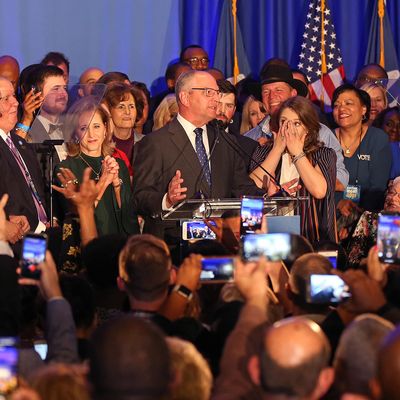
The Louisiana gubernatorial runoff election over the weekend was a no-excuses test for President Trump. He couldn’t blame a defeat for his candidate on an unpopular incumbent like Kentucky’s Matt Bevin. And there was no evidence between the first round of the state’s nonpartisan “jungle primary” last month and the November 16 conclusion of some deep polling deficit for Republican Eddie Rispone, who had tons of money and momentum after edging out the early Republican front-runner, Congressman Ralph Abraham. Indeed, aside from Louisiana’s very red political complexion (Trump won the state by 20 points in 2016), the conventional wisdom held that Republicans would have an advantage in a runoff thanks to their voters’ superior likelihood to turn out.
So Trump probably felt it was relatively safe to invest heavily in Rispone’s campaign to oust Democratic governor John Bel Edwards. And he sure did, as Politico observed after Edwards won:
The president went all-in, visiting the state three times, most recently on Thursday …
In addition to the rallies, he called into conservative radio stations on Rispone’s behalf, recorded get-out-the-vote robocalls and videos, and sent out a stream of tweets savaging Edwards. On Saturday, the president wrote several tweets encouraging Louisianans to cast their ballots for Rispone.
Trump’s political operation also invested heavily, with the Republican National Committee spending $2 million on the race. The president took a personal interest in the contest, quizzing aides and allies about developments.
During an appearance on a Louisiana radio program Friday, Vice President Mike Pence remarked that “the president and I have left it all on the field.”
It wasn’t enough. Now, the results were not entirely the Trump referendum POTUS tried to engineer; Edwards had a positive job approval rating, and was broadly perceived as having brought Louisiana a long way back from the disaster of his predecessor Bobby Jindal’s second term. The incumbent was particularly popular with African-American voters, whose strong turnout probably decided the runoff, as Harry Enten observed:
In heavily African American, Caddo, East Baton Rouge and Orleans parishes, turnout was up about 15% to 30% compared to last month’s Louisiana “jungle primary” — in which all candidates, regardless of party affiliation, ran against each other and the top two advanced because no candidate reached a majority.
Parishes in the rest of the state saw a lower increase in turnout.
This trend in the early vote data suggested that African Americans were going to make up a larger share of voters in the runoff than they did in October’s jungle primary.
The higher black turnout was reminiscent of what occurred in 2017’s Alabama’s special Senate election. Large turnout from African Americans helped put Democrat Doug Jones over the top in that election. The same could probably be said about Edwards in Louisiana.
Democrats nationally will go to school on how their Louisiana chapter accomplished this task, which could be crucial in many states in 2020.
Yes, Edwards, among the last of statewide Democrats anywhere who oppose legalized abortion and gun regulation, was an unusual Donkey Party candidate. But that didn’t keep Trump and Republicans generally from demonizing him:
There is one theory about the Louisiana outcome that doesn’t have much of anything to do with Trump, hard as it is for him or for the rest of us to see beyond his domination of the political landscape:
Good thing for Alabama’s Republican governor Kay Ivey that she’s not up for reelection this year or next.






























